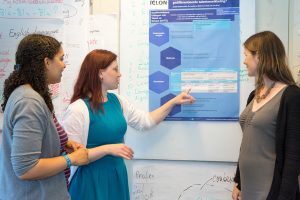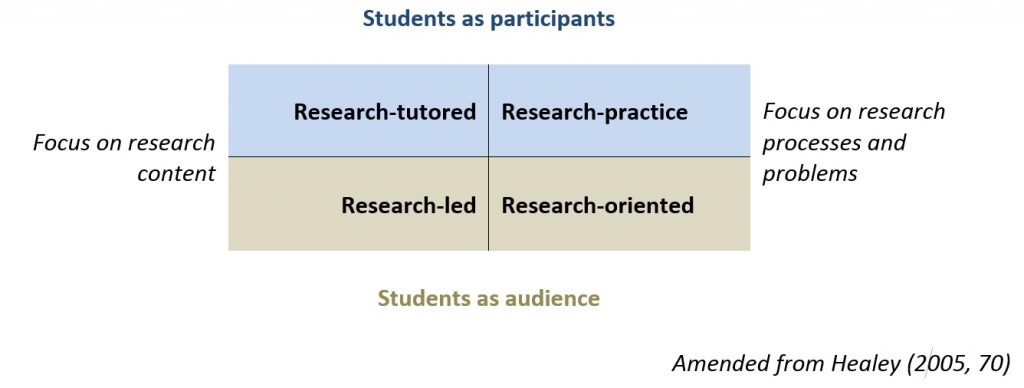There are several ways to engage students in research and in doing so promoting the development of students’ knowledge, skills, and attitudes (for an overview see Van der Rijst, 2017). Engaging students in authentic research activities gives them the opportunity to develop essential disciplinary skills and a deeper understanding of fundamental concepts.
Getting started
Not all modes of integrating research into teaching are experienced as equally effective. It depends on the desirable student learning outcomes, specifically when teaching large groups of students. The initial consideration is: what do you want student to learn about and/or from (doing) research?
The following questions are a starting point.
For teachers:
- What student outcomes do you aim to promote in terms of skills, dispositions or knowledge and understanding?
For example, to promote problem solving skills it is recommended to let student work on wicked problems/cases, but to promote student understanding of research findings a lecture may be appropriate.
- What student outcomes do you aim to promote in terms of student experiences of research in teaching?
For example, to promote student motivation for research showing advanced theoretical or methodological models may work, yet to promote students confidence in their own research skills it may be more appropriate to let them conduct small parts of a study.
For programs:
- What is already being done to integrate research into teaching?
For example, are students informed about the departments’ research? Is critical reflection on research findings and methods a regular part of lectures and workgroups?
- What steps need to be taken to integrate research and teaching more firmly?
For example, here first-year students’ research vivid experience contributes to their understanding of what it means to create knowledge (example research-based teaching)
Further reading
The table below shows examples of approaches for strengthening the role of research in university teaching, their defining characteristics and suggestions for further reading.
| Concept(s) & typologies | Characteristics | Further reading |
| Inquiry-based learning, problem-based learning, project-based learning, case-based learning
|
Authentic (professional) problems/cases drive learning; student-centred teaching approach; (interdisciplinary) subject matter focus; | Aditomo et al. (2013) |
| Research-led; research-oriented; research-based; research-informed teaching
|
Teaching concerns research findings or research processes; students can be positioned as audience or participate in the role of researchers | Griffiths (2004); Healey (2005) |
| Tangible and intangible aspects of research in teaching
|
Teacher acts as role model for research(er); student experience is central | Neumann (1992) |
| (Under)graduate research | Apprenticeship model; student conducts research project under supervision | Brew (2003, 2010); Zimbardi & Myatt (2014) |
- Aditomo et al. (2013). Inquiry-based learning in higher education: Principle forms, educational objectives, and disciplinary variations. Studies in Higher Education, 38, 1239-1258.
- Brew, A. (2003). Teaching and Research: New relationships and their implications for inquiry-based teaching and learning in higher education. Higher Education Research & Development, 22(1).
- Brew, A. (2010). Imperatives and challenges in integrating teaching and research. Higher Education Research & Development, 29(2), 139-150.
- Griffiths, R. (2004). Knowledge production and the research–teaching nexus: The case of the built environment disciplines. Studies in Higher Education, 29(6), 709-726.
- Healey, M. (2005). Linking research and teaching: Exploring disciplinary spaces and the role of inquiry-based learning. In R. Barnett (Ed.). Maidenhead: The Society for Research into Higher Education & Open University Press.
- Hu, Y., van der Rijst, R. M., van Veen, K., & Verloop, N. (2019). Integrating research into language teaching: Beliefs and perceptions of university teachers. Innovations in Education & Teaching International, 56(5), 594-604.
- Hu, Y., van der Rijst, R. M., van Veen, K., & Verloop, N. (2015). The role of research in teaching: A comparison of teachers from research universities and those from universities of applied sciences. Higher Education Policy, 28, 535-554.
- Neumann, R. (1992). Perceptions of the teaching-research nexus: a framework for analysis. Higher Education, 23(2), 159-171.
- Van der Rijst, R. M. (2017). The transformative nature of research-based education: A thematic overview of the literature. In: Bastiaens, E., van Tilburg, J., & van Merriënboer, J. (Eds.), Research-based learning: Case studies from Maastricht University (pp. 3-21). Cham, Switzerland: Springer.
- van der Rijst, R. M., Visser-Wijnveen, G. J., Verloop, N., & van Driel, J. H. (2013). Undergraduate science coursework: Teachers’ goal statements and how students experience research. Innovations in Education & Teaching International, 50(2), 178-190.
- Vereijken, M. W. C., van der Rijst, R. M., De Beaufort, A. J., van Driel, J. H., & Dekker, F. W. (2018). Fostering first-year student learning through research integration into teaching: Student perceptions, beliefs about the value of research and student achievement. Innovations in Education and Teaching International, 55(4), 425-432.
- Vereijken, M. W. C., van der Rijst, R. M., Dekker, F. W., & van Driel, J. H. (2018). Student perceptions, beliefs and learning outcomes in the context of strengthening research integration into teaching in the first year of medical school. Advances in Health Sciences, 23, 371–385.
- Visser-Wijnveen, G. J., van der Rijst, R. M., & van Driel, J. H. (2016). A questionnaire to capture students’ perceptions of research integration in their courses. Higher Education, 71,473-488.
- Visser-Wijnveen, G. J., van Driel, J. H., van der Rijst, R. M., Visser, A., & Verloop, N. (2012). Relating academics’ ways of integrating research and teaching to their students’ perceptions. Studies in Higher Education, 37(2), 219-234.
- Zimbardi, K., & Myatt, P. (2014). Embedding undergraduate research experiences within the curriculum: A cross-disciplinary study of the key characteristics guiding implementation. Studies in Higher Education, 39(2), 233-250.



